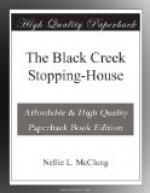Table etiquette was fairly well observed—the person who took the last of the potatoes was in duty bound to take the dish out to the kitchen and replenish it from the black pot which stood on its three legs on the back of the kitchen stove. The same rule applied to the tea and the bread. Also when one had finished his meal the correct plan of procedure was to gather up his plate, knife and fork and cup and saucer and carry them out to the kitchen, where Mrs. Corbett or Peter Rockett hastily washed them to be ready for the next one.
When entering the Black Creek dining-room with the purpose of having a meal there were certain small conventions to be observed. If a place was already set, the newcomer could with impunity sit down and proceed with the order of business; if there was no place set, but room for a place to be set, the hungry one came out to the kitchen and selected what implements he needed in the way of plate and knife and proceeded to the vacancy; if there was not a vacant place at the table, the newcomer retired to the window and read the Northern Messenger or the War Cry, which were present in large numbers on the sewing-machine. But before leaving the table conversation zone, it was considered perfectly legitimate to call out in a loud voice: “Some eat fast, some eat long, and some eat both ways,” or some such bright and felicitous remark. It was a bitter cold day in November—one of those dark, cold days with a searching wind, just before the snow comes. In Mrs. Corbett’s kitchen there was an unusual bustle and great excitement, for the women from the Tiger Hills were there—three of them on their way to Brandon. Mrs. Corbett said it always made her nervous to cook for women. You can’t fool them on a bad pudding by putting on a good sauce, the way you can a man. But Mrs. Corbett admitted it was good to see them anyway.
There was Mrs. Berry and her sister, Miss Thornley, and Mrs. Smith. They had ridden fifteen miles on a load of wheat, and had yet another fifteen to go to reach their destination. In spite of a long, cold and very slow ride, the three ladies were in splendid condition, and as soon as they were thawed out enough to talk, and long before their teeth stopped chattering, they began to ask about Mrs. Corbett’s neighbor, young Mrs. Brydon, in such a way, that, as Mrs. Corbett afterwards explained to Da Corbett, “you could tell they had heard something.”
“Our lads saw her over at the Orangemen’s ball in Millford, and they said Rance Belmont was with her more than her own man,” said Mrs. Berry, as she melted the frost from her eyebrows by holding her face over the stove.
“Oh, well,” Mrs. Corbett said, “I guess all the young fellows were makin’ a lot of her, but sure there’s no harm in that.”
Miss Thornley was too busy examining her feet for possible frostbites to give in her contribution just then, but after she had put her coldest foot in a wash-basin of water she said, “I don’t see how any woman can go the length of her toe with Rance Belmont, but young Mrs. Brydon went to Brandon with him last week, for my sister’s husband heard it from somebody that had seen them. I don’t know how she can do it.”




